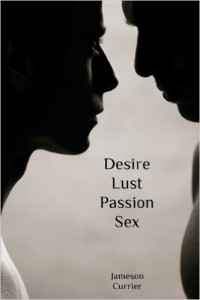 Desire, Lust, Passion, Sex
Desire, Lust, Passion, Sex
by Jameson Currier
Green Candy Press. 288 pages, $14.95
THE TITLE of Jameson Currier’s book of short stories, Desire, Lust, Passion, Sex, making use of four words that need to go on a ten-year hiatus, kept my initial expectations for this book low. The opening story, “Lessons,” a tale about a man who rediscovers his libido with the help of a few dildos and an older teacher, didn’t help matters, because it reads like a class exercise rather than a sincere inquiry into what it means to rediscover sex in middle age. “Even though those gates of mine had been closed so long the locks were rusty, I was still standing outside my closet.” And the explicit descriptions of being busted by a dildo made me wonder who this story is for. Gay men who want to know more about the risks of sexual aids? If so, this is a pretty specialized readership to be addressing.
But then I noticed something. Each story is enveloped with an adult sadness. These were not just stock tales where the big orgasm comes at the end (I’ve read a number of those). They were tales of men who found some combination of desire, lust, passion, and sex way too baffling to be articulated. And what’s more universal than that?
In “Snow,” Tyler is stuck in an unnamed city due to a blizzard, so he calls an escort. He’s into the escort, but after a night of sex he’s tired of him and wants him to leave. “At the window, Tyler rubbed his hand along the fine hair of his own chest and realized he might be attracted to Brad if he had been someone else.” Once the rush of desire is spent, Tyler searches for something else. Anything. “For a moment he thought about running out like a lunatic—racing down the hall and into the lobby with nothing on. At least he might be arrested. At least it would take him to jail. Somewhere else.” The hustler wants to play, but Tyler is angry and that need for what the hustler has only returns when the snow has stopped and they are in the elevator ready to depart.
Currier’s strength is in finding the perfect note that evokes inarticulateness. In “Fearless,” Barry, an HIV-positive young man, and David, a negative middle-aged man, attempt to have a relationship, but it fails because neither knows how to talk to the other honestly. “David had also come to believe, in that same lighthearted manner, the only person who could fall in love with him now would have to be someone obscenely rich. Or would have to be either a doctor or a psychiatrist, someone who could talk David out of all his neuroses. He told none of this to Barry of course.” Differences of class and health status are part of the problem, but it’s their lack of openness, their inability to acknowledge their fears, that causes most of the trouble.
Currier’s characters may be silent when it comes to putting their hearts on the table, but when it comes to sex, they’re loud and clear. Dru, the main character in “Expatriates,” is having his first gay relationship, although he refuses to call it that. His reticence makes perfect sense because he’s also involved with Annette and has always considered himself straight. However, Rusty has moved something in Dru: “For the rest of the day Dru could not erase the presence of Rusty’s hand on his cock. It came to him while he was watching TV, while he was eating dinner, while he was in bed, later, with Annette.” Dru joins a gym, starts to wear newer clothes, and is even shocked when he turns jealous over Rusty’s friendship with another man. But Dru makes none of his feelings public. Rusty eventually leaves and Dru decides to marry Annette.
The recurring theme of these stories is the character’s lack of intimacy despite their physical interaction. Sure desire, lust, passion, and sex are easy to come by, but life after orgasm is far more complicated. This is where Currier’s interest lies. These stories force us to think about what it all means if our connections are based on sex without emotional connectedness.





